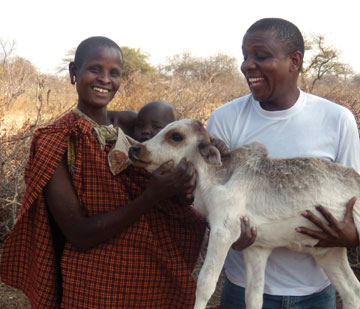Volume 26 · Number 2 · Winter 2009

HALI field coordinator Harrison Sadiki visits a Masaai household. (Photo: David Wolking)
Harrison Sadiki
Veterinarians can often trace their dreams to become animal doctors to a single childhood moment. Harrison Sadiki, the Tanzanian regional field coordinator for the HALI project, is no exception. When he was 8, he watched a beloved family dog, Simba, die because of a bone caught in his back teeth. Armed with his 100 shillings, young Harrison walked five miles to the nearest vet in Kilimanjaro, Tanzania, and five miles back with him, only to be told there was nothing that could be done because the doctor had left the sedative behind at the clinic. Harrison resolved to learn to help animals himself.
Sadiki trained as a veterinarian at Sokoine University of Agriculture in Tanzania and subsequently earned his master’s degree investigating bovine tuberculosis under the direction of Professor Rudovick Kazwala, one of the lead researchers on the HALI project and a world authority on bovine TB. Now as field coordinator for the project, Sadiki must ensure that all logistics, from lab equipment to vehicles and drivers, are in place in order for the sample collection to take place. Freezers and generators must be kept running no matter what. HALI staff must be trained on proper disease-testing techniques; coordination with local and regional officials is essential.
“As a Tanzanian, I am hopeful that improved guidelines for management of animals — particularly livestock — will improve life in rural villages,” says Sadiki. Cross-breeding the Tanzanian short-horned zebu, the breed kept by most pastoralists, with the stockier Kenyan boran, for example, would produce larger animals, allowing smaller herds with reduced demand on water and land resources. “I have been used to working with livestock. Because of my opportunity to work with HALI, now I work with wildlife also. It’s important to keep a balance.”
Achieving balance is HALI’s great mission and its greatest challenge. With team members like Harrison Sadiki, there’s a good chance of success. “Harrison’s strong scientific training and genuine passion for improving the health of animals and people are great assets to HALI,” said Deana Clifford, HALI project coordinator. “He is comfortable in the laboratory testing for diseases or in the villages testing animals and listening to people’s concerns.”
« Back to Troubled Waters in Tanzania
